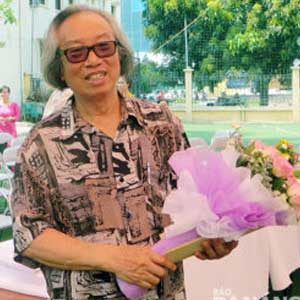Van Tho (1938-2025)
Biography
Van Tho’s paintings presents distinctive characters in flexible using of palette color and the quick manner of drawing. It is said that his paintings are, to some extent, under effects of Picasso. But in his generation, Picasso had affects on many people or gave them the new insight for change. With quick paintings and a lot of paintings, it is seemed that Van Tho want to record fleeting impressions on people and landscape instead of creating deep-flying paintings. He has his own painting style with simple layouts which do not exceed a realistic painting. Van Tho’s paintings present the simplicity from observed subjects, layout to the formation of contours and mixture of colours. It is seemed that the artist preferred the opposite relationship of colors: light yellow, lime with cobalt blue, blue; orange with green, dark blue …. Therefore, people, landscape, boats, sky with curl cloud, sea surface with billowing waves, endless sandy beaches stand out in many ways, with antithesis and without disputes. The multi-coloured pallet of Van Tho is close to folk art, Dong Ho paintings, Hang Trong and votive objects in which Nguyen Tu Nghiem used to be interested. Portrait is a special series of the artist. With a big part of colour as the background, a few lines depicting characters, embellishing lines the face, hands, sketches on clothing and appearance, an old-timer Van Cao with honest and gentle smile, a Bui Xuan Phai with patterns of old quarters, a Nguyen Sang with vigorous eyes on the life or portraits of gentle women may appear before our eyes. Colors which are seemed to be plain but show the destiny of characters who the artist sees and interprets. The solitude of Van Cao can be seen not only through portraits but also in yellow background frame such as colors of Van Gogh’s self-portraits. Van Tho was born in 1938. He graduated from graduated from Hanoi University of Fine Arts. His art is widely known in the country and in foreign countries with many individual exhibitions and those of typical author group in his generation.
- THE SIMPLICITY IN VAN THO’S PAINTINGS
Article about the artist

Van Tho (1938-2025)
VAN THO
1938: was born at Thanh Liem District, Ha Nam province, Vietnam.
Graduted from the Hanoi, Vietnam Fine – Arts University
Member of the Vietnamese Fine – Arts Association
Member of the Hanoi Arts Association
PUBLIC COLLECTIONS
He is very well-known with his big lacquer and oil paintings (size 10 to 20m) of great subjects shown at solemn places, such as: The Meeting Hall, Office of the Party Center Committee, Office of the National Assembly, Ministry of National Defense.
A BRUSH WITH HANOI
Van Tho ( his name literally means ‘literary poem’ – his parents were writers and artists) is one such successful artist. His five-storey house on the outskirts of Hanoi is opulent in its size, yet understarted in its furnishings. It is what you’d expect of a successful painter. The walls are filled with his work; in some of th high-walled rooms it seems as if the ceilings are held up by his paintings. His house also serves as a gallery for some of his select collectors. And there are certain eccentric touches; a dove flies free around the house, resting on my hand while I sit on Van’s sofa sipping tea.
The 66-year-old painter’s work is big and abstract, almost primitive. Instead of a brush, he uses a trowel to apply paint to his canvases. Influenced by Picasso, his paintings are his renditions of faces and people; although he is quick to point out they are portraits of people that he sees in his mind.
Van started his artistic life as one of Vietnam’s Social Realist painters; his work still hangs in many of the government ministry buildings. His murals – a combination of painting and wood carving – are very complex scenes of pagodas, people working and pastoral village’s scenes. Each would take Van and his assistants up to a year to complete.
Kris LeBoutillier.
Photographer and writer
(Singapore Airline Magazine, May 2004)








